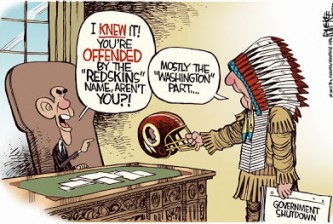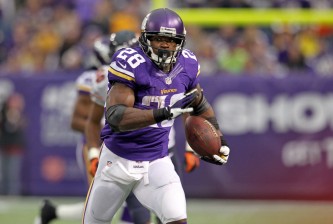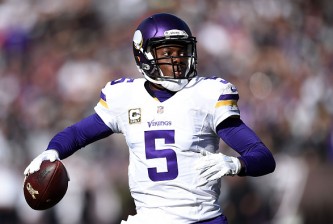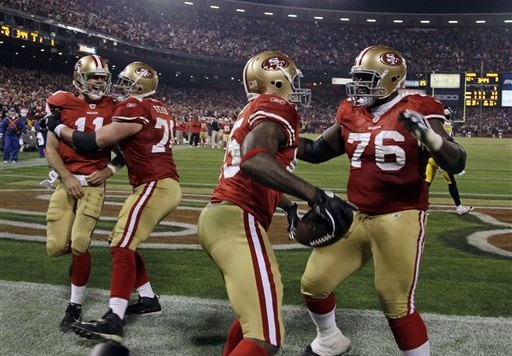Bottom Line: Put your money in fantasy football and not in athlete fantasy stock.
Hand it to Fantex. The collapse of last year’s Arian Foster stock offer has not stopped them from a second try, this time with a tracking stock tied to San Francisco 49ers tight end Vernon Davis.
Fantex offered Davis an up-front, $4 million payment in return for 10 percent of his future earnings. They are financing it through an initial stock offering to fans of 421,000 shares priced at $10 per share. Fans have until the end of today, Friday, April 25, to share in this ground floor opportunity.
UPDATE: Fantex offered Texans RB Arian Foster $10 million for 20 percent of his brand income in 2013. Fantex put the offer on hold when Foster was lost for the season due to injury. Some reports say the offer for the Arian Foster tracking stock is baack on.
Throw a red flag for a coach’s challenge. There are too many “gotchas” in this deal ever to pay off. Here are a few.
No. 1 — The numbers don’t work.
Vernon Davis gets his upfront payment from Fantex who recovers the payout from you. Davis’ future income must exceed $42 million before Fantex’ 10 percent stake starts reaches breakeven. Magic Johnson is the rare example of a retired athlete who made it big as an investor. Is Davis that guy? Perhaps, but lotto tickets are better bets. Davis does, however, rely on Magic as a financial mentor.
No. 2 — Father Time is undefeated.
Vernon Davis is a 30-year-old veteran going into his ninth NFL season. First-round Draft picks have a nine-year NFL career on average. Davis was the sixth-overall pick in 2006. He is unlikely to survive his contract extension with the ‘Niners. The marketplace is unkind to older players, thanks in part to the rookie pay scale. His next NFL contract is certain to be lower.
No. 3 – Our favorite sport may be killing our favorite athletes and their income potential.
Football is a brutal game. The league itself accepts the reality of concussion and physical breakdown. Higher risk and its long-term effects can depress a player’s income during and after his career.
No. 4 — A high percentage of athletes go broke after retirement.
This it has become a cliché. A 2009 Sports Illustrated story by Pablo Torre explained why to considerable depth. Athletes entrust their financial futures those who came up with them, a relative or trusted friend who knows “somebody” without genuine investment knowledge. Or, they do not grasp what they are being told by a financial adviser. In the SI story, Raghib Ismail said in a meeting with J.P. Morgan, he felt like “he was talking to Charley Brown’s teacher.”
Elite athletes do not train for this. Davis was a Studio Arts major at Maryland. Fantex says they will help guide the athlete’s brand. No one knows what that means.
No. 5 — Aggressive athletes lose money aggressively.
Athletes approach investing as they approach the game. They take big risks by turning the investment pyramid on its head, with heavy investments in the riskiest ventures while bypassing conservative plays that should be their financial foundation. Have these guys never heard of savings bonds?
No. 6 — Vernon Davis is not a quarterback.
The players with the brightest income prospects are quarterbacks. Of course, $100 million quarterbacks are unlikely to sign away 10 percent of their future income for an upfront payment. Call me if they ever do. I could be interested in a play on Peyton Manning or Johnny Football.
Quarterbacks are no exception to aggressive investing. Drew Bledsoe, Mark Brunell, even Johnny Unitas met with disaster when business investments collapsed and they could not repay the debt incurred in the venture.
If the Davis stick sale works, Fantex says their next offering will be an E. J. Manuel Tracking stock. Manuel is the starting quarterback for the Buffalo Bills who is still establishing his NFL career. His future income is less well understood than for Davis, or for the Manning brothers.
No. 7 — Pro athletes are magnets for lawsuits.
From the frivolous to the domestic, divorce and child support, lawsuits have a way of ruining brand value and siphoning financial stakes that fuel future income. Unlike skill sets, law suits are hard to forecast.
No. 8 — You’re not the boss of Vernon Davis.
Fantex makes clear to anyone who reads past the headline that investors are not buying a share in Vernon Davis’ actual income. They are buying a share in Fantex itself and they can only sell it on an exchange managed by Fantex who pretty much sets the price of the sale. Fantex promises to track that value to Davis’ actual income that Fantex collects. There is no promise to share it as dividends. Neither investors nor Fantex have a say in managing Davis’ brand or business decisions. Fantex can only offer advice, which he may take or leave. Snake oil.
No. 9 – This could be a jinx.
Fantex agreed to buy a 10 percent stake in Arian Foster’s future earnings and then Foster suffered a season-ending back injury in November 2013. Injuries happen in football. This might be coincidence or as relevant as the Madden Curse. Yes, I am football superstitious, but 49ers fans should be worried, very worried.
No. 10 – You have better odds in Vegas.
The gambling crowd understands the odds and risks of wagers because they understand how sports books work. Bookies set odds to attract an equal pot on both sides of a bet. We don’t yet know how Fantex will balance the buy and sell of Davis stock, but gamblers get this play better than “investors” will. Gamblers know they are gambling.
Real investors should run away, very fast and very far.
04/29/14 UPDATE: Fantex sold the full subscription of Vernon Davis stock and opened trading on Monday, April 28, 2014. The price rose to $12 per share on a trade of 390 shares late Monday afternoon. The IPO price was $10 per share for the subscription of 421,000 shares that closed Friday.























